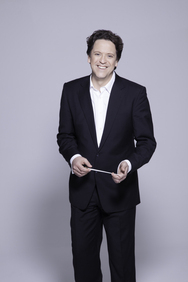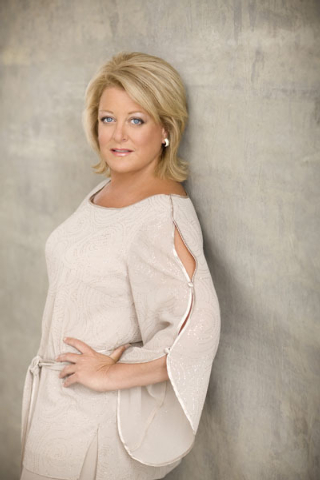Philharmonic celebrates new music director’s arrival







Like racehorses in the starting gate, champing at the bit.
That’s how Las Vegas Philharmonic’s concertmaster De Ann Letourneau characterizes the orchestra’s mood as new music director Donato Cabrera takes the reins Saturday for the Philharmonic’s 16th-season opener.
Cabrera knows the feeling.
“What I’m looking forward to, frankly, is just working with the orchestra,” he says.
Saturday’s Masterworks concert at The Smith Center’s Reynolds Hall is only the second time Cabrera has conducted the Philharmonic; their first collaboration came during January’s “Battle Born” program, when Cabrera was one of 16 guest conductors vying to become the orchestra’s music director during a two-season search.
Cabrera may be on the podium Saturday night, but he shares the spotlight with a longtime friend: star soprano Deborah Voigt.
“Maybe I should be a little bit more egotistical,” Cabrera acknowledges, but “I love to put the spotlight on other people.”
After all, “that’s what’s so wonderful about being a conductor,” he says. “You’re a facilitator. You help other people shine.”
Not that Voigt needs much help in that department.
The renowned soprano possesses “a world-class voice, a one-in-a-million voice,” says Cabrera, along with “a sense of intimacy that can be heard” throughout a concert hall.
“It’s as if she’s singing only for you,” he says. “Maybe you’re sitting in Row XX, in the balcony. She has this gift.”
Saturday’s concert marks the conclusion of a notable week for Voigt: Monday was the deadline for her tell-all autobiography, “Call Me Debbie: True Confessions of a Down-to-Earth Diva.”
The book, to be published next January, covers (among other topics) Voigt’s battles with food and alcohol addiction, including a controversial 2004 incident in which Royal Opera House officials replaced her in the title role of Strauss “Ariadne auf Naxos,” because she couldn’t fit into one of the costumes, a “little black dress.” (Voigt subsequently had gastric bypass surgery to lose weight.)
“I sometimes think that, when the annals of operate history are written, there’ll be a little black dress with my picture next to it,” she says in a telephone interview. “The sad fact is, what people remember is some sort of event, some sort of signature. And that was one of mine.”
But back to the music.
The Voigt-Cabrera mutual admiration society began in 2009, when Voigt was singing Wagner’s “Tristan und Isolde” at the Chicago Lyric Opera; Cabrera was an assistant conductor.
“I was a very nervous Isolde, as I always am,” Voigt says, and Cabrera “had such a calm demeanor,” she notes, describing him as “a man who was definitely going to have a career of his own.”
Since then, their paths have crossed and their friendship has endured, but “I’ve never really sung under his baton before,” Voigt acknowledges.
She doesn’t think she’s ever performed in Las Vegas before either — or “if I did, it was a hundred years ago with the now-defunct Western Opera Theater. So I’m looking forward to the musical experience.”
During Saturday’s concert, Voigt will sing two arias: “Du bist der Lenz (You Are the Spring)” from Wagner’s “Die Walkure” and “Abscheulicher (Abominable One)” from Beethoven’s “Fidelio.”
She’ll also perform three Broadway favorites: Kern’s “Can’t Help Lovin’ That Man” (from “Showboat”) and “Why Was I Born” (from “Sweet Adeline”), along with “My Man’s Gone Now” from Gershwin’s “Porgy and Bess.”
The Broadway selections are “core to my being,” she says, noting that “I was raised singing gospel music and musicals.”
Along with those Broadway tunes, Saturday’s concert features the Las Vegas premiere of Mason Bates’ “Attack Sustain Decay and Release,” which Cabrera describes as “a great piece, an exciting piece, by a living American composer.”
Its presence on the program underscores Cabrera’s belief that “classical music must remain a living art form,” he explains.
“No matter how much we love” favorites from the past, without new works “classical music will become irrelevant,” Cabrera contends. “It’s my responsibility — and the Las Vegas Philharmonic’s responsibility — to support this sense of renewal.”
And “in the context of the concert, when pairing it” with more familiar works, “it’s a pretty easy pill to swallow. And the thing with Mason’s music, once people hear it, they love it,” he says.
“Not that playing Beethoven isn’t interesting, but we need to compete,” Letourneau adds. “What makes someone want to go to the Philharmonic instead of a Cirque show?”
Rounding out Saturday’s program: Wagner’s Overture to “Der fliegende Hollander (The Flying Dutchman),” Beethoven’s Leonore No. 3 (an overture usually performed during “Fidelio’s” second act) and Ravel’s “La Valse,” which Cabrera describes as “a piece I really love.”
The new music director’s arrival has sparked genuine excitement among Philharmonic musicians, Letourneau says.
“He has a real vision for where he wants to lead this orchestra,” she says.
Cabrera also has a real connection to Las Vegas, where he lived until he was 10 years old. (He still has family in town.)
“It’s nice to have someone who has a vested interest in this community,” Letourneau says. “He wants to be here; it’s not just another job.” (Although, for now, Cabrera’s maintaining his other current posts, including resident conductor at the San Francisco Symphony and director of its youth orchestra, music director of the California Symphony in Walnut Creek and music director of the New Hampshire Music Festival.)
Now that he’s added the Las Vegas Philharmonic post to his resume, “the main goal is to create an atmosphere,” Cabrera says.
“It’s a matter of trust,” he says. “What everyone is doing up there is very technically demanding, with very little room for error. There are a lot of high expectations,” and “if there isn’t a relationship built on trust, it’s so much harder to achieve those goals.”
But he’d rather concentrate on the excitement surrounding Saturday’s concert.
“There are a whole bunch of positives,” Cabrera says, “and a ton of potential.”
Contact reporter Carol Cling at ccling@reviewjournal.com or 702-383-0272.
Preview
Las Vegas Philharmonic with guest Deborah Voigt
7:30 p.m. Saturday; pre-concert talk at 6:45 p.m.
Reynolds Hall, The Smith Center for the Performing Arts, 361 Symphony Park Ave.
$26-$94 (702-749-2000, www.thesmithcenter.com)


















